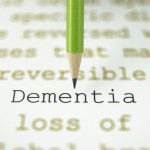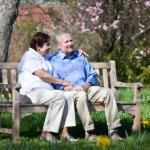When I think about our future I don't worry much about strokes, heart attacks, broken hips or even cancer. I've done all that I can, or more precisely all that I care to at the moment, to prevent those things from happening. I weigh 148.4 pounds this morning, way done from my high school weight of 172, eat lots of fruits and vegetables, and exercise very vigorously six days a week. My wife works out as much as I do, although at a lesser pace. Now that we have a new dog, we're getting much more weight-bearing exercise, walking 40 to 80 minutes a day.
What I do worry about is dementia, for either of us. We have a long-term-care policy, but when we got it we limited the number of years covered. My choice would be not to live a long demented life. If I have Alzheimer Disease and get pneumonia, don't even think of giving me antibiotics.
A 2007 article in the journal Neuroepidemiology, with the lead author being, B L Plassman, reported on the "Prevalence of Dementia in the United States: The Aging, Demographics and Memory Study." Eleven years ago there were an estimated 3.4 million people in the U.S. who were 71 and older (I'm 72) felt to have dementia. That was 13.9% of that population group. Most had Alzheimer Disease (9.7% of the 71+ year-olds or 2.4 million).
Age is a significant factor here as 5.0% of people in the 71-79 year-old group had a dementia diagnosis and 37.4% of those over 90.
At my age the Social Security database says I can expect to live 12.44 more years on average and my wife, about to be 73, can expect to live 13.91 more years. And those are the averages; my bet is as active and slender as we are and especially with my family history, one or both of us may well make it past 90.
The Cleveland Clinic online discussion of the problem, titled "Types of Dementia," mentions neurological diseases, vascular disorders (multiple small strokes can lead to one form), infections (e.g., HIV), chronic drug use, depression and accumulation of fluid within the brain (AKA hydrocephalus). Roughly 20% of all cases of dementia may have a treatable cause.
They estimate that 5-8% of those over age 65 have one or another form of dementia and that number doubles every five years above that age range. Some would estimate as many as 50% of those 85 and up have some form of the disorder, way over the percentage in that 2007 article.
Their approach is to group the problem into Alzheimer Dementia (50-70% of all dementia) and non-Alzheimer Dementia. And they are careful to distinguish between treatable and curable forms of dementia. Most forms are treatable; few are curable at present.
We've been through dementia scenarios on both sides of my family. My mother's last four years (from age 86 to 90) were spent in large part with Dad, who was quite competent mentally. He had resuscitated her from a cardiac arrest when she was 74 and she had twelve good years subsequently. But I have a photo of the two of them taken at their 65th wedding anniversary and Mom looks rather vague and unfocused. She wasn't violent or difficult in her last years, but would sit for hours reading...with the book held upside down.
Lynnette's mother, who lived until she was 86, had outbursts of anger over minor things that she was previously have been unfazed by; she would swear at someone in the nursing home over trivial affronts. Her short-term memory was gone and after Lynnette and her sister got their Mom into the long-term care facility, she'd call my wife and say,"If you don't get me out of here immediately, I'll never speak to you again!"
A half hour later she'd have completely forgotten the episode.
We have and will have growing numbers of our elderly parents, grandparents, friends and our own selves with these issues. How best to take care of them?
Air Force Village II, where our surrogate parents live (they were patients of mine, ran our wedding in 1988 and decided we'd be another set of their adult children), has an Alzheimer and other forms of Dementia Research Unit called Freedom House in cooperation with the University of Texas Health Science Center in San Antonio. It's been in operation for fifteen years and is state of the art.
When I last visited that domicile for patient with one or another cause of dementing disease, I was greatly impressed by the caring staff and their innovative approach to its occupants.
A May 20, 2013 article in The New Yorker is titled "The Sense of An Ending." Staff reporter Julia Mead wrote about new ways to care for people with dementia. She notes that most care facilities operate with the "medical model," aiming to postpone dying through progressively escalating interventions.
Other places, including the one she featured, have adopted a more holistic approach, relying less on psychotropic medication, those commonly used by psychiatrists to alter chemical levels in the brain which impact mood and behavior.
A woman named Tena Alonzo, featured in the New Yorker article, has spent twenty-eight years dealing with dementia patients and prefers to refer to them as "people who have trouble thinking." Alonzo is the co-director of PCAD, Palliative Care for Advanced Dementia, at a retirement community in Phoenix. Her work, done in concert with her physician co-director, emphasizes comfort for the afflicted individual; knowing their life story and incorporating it into the care plan, individualizing care to meet the needs of the person (not the staff), anticipating their needs versus waiting for behaviors to occur, and having her staff act as the voice of those with dementia.
Her retirement home has no fixed bedtimes, rising hours or even mealtimes; staff walk around with plates of small sandwiches and cookies and lemonade are offered on a movable snack cart. Dementia patients often lose weight as they become less likely to ask for food or drink.
In a 2010 publication, Alzheimer disease was the seventh leading cause of death in the United States with annual costs estimated at $172 billion and unpaid care being given by 10.9 million of us.
We have a friend who is working on a major project to treat Alzheimer disease, but until his work and that of many others comes to fruition, alternate concepts of how those afflicted can be cared for are desperately needed.
I'm glad to see some are trying innovative approaches.





